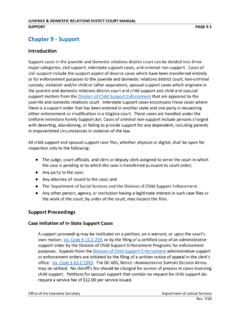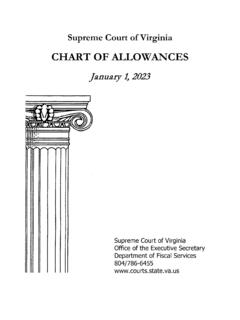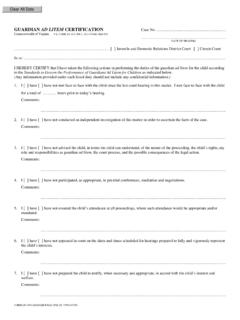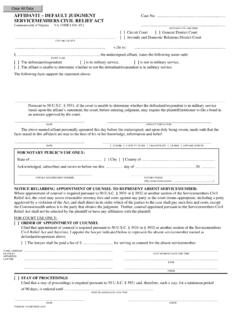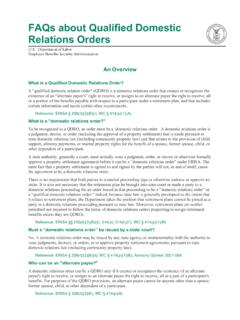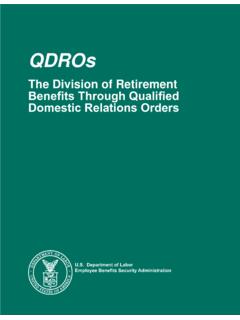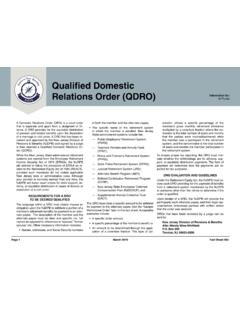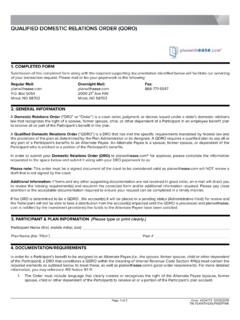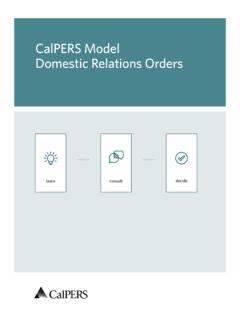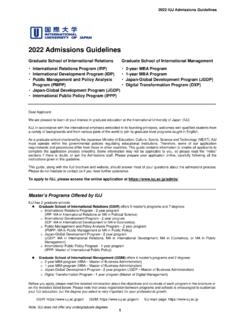Transcription of The Circuit Court - Judiciary of Virginia
1 The Circuit Court The Circuit Court is the trial Court of general jurisdiction in Virginia , and the Court has authority to try a full range of both civil and criminal cases. Civil cases involve disputes essentially private in nature between two or more parties; criminal cases are controversies between the Commonwealth and persons accused of a crime. Only in a Circuit Court is a jury provided for the trial of many of these disputes and controversies. The Virginia Circuit Court system is composed of 31 judicial circuits with 120 separate Circuit courts in the various counties and cities of the Commonwealth.
2 The Supreme Court of Virginia establishes the rules of practice and procedure for the Circuit courts, and the Executive Secretary of the Supreme Court serves as the administrator of the Circuit Court system. Judges and Clerks A Circuit Court judge is elected for an eight-year term by a majority vote of both houses of the General Assembly. If the General Assembly is not in session when a vacancy occurs, the Governor may temporarily appoint a judge (interim appointment) to serve until the General Assembly meets again and can elect a judge for a full term.
3 There are at least two judges serving each Circuit and as many as 15 serving in larger circuits. The chief judge of the Circuit is elected by majority vote of the judges serving the Circuit . Circuit Court judges are required to reside in the Circuit they serve and must have been admitted to the Virginia Bar at least five years prior to election or appointment. The clerk of the Circuit Court is a constitutional officer elected to an eight-year term by the voters of the locality. The clerk handles administrative matters for the Court and also has authority to probate wills, grant administration of estates, and appoint guardians.
4 The clerk is the custodian of the Court s records, and the clerk s office is where deeds are recorded and marriage licenses issued. Jurisdiction The Circuit Court has jurisdiction over civil cases with claims of more than $4,500. It shares authority with the general district Court to hear matters involving claims that exceed $4,500 but do not exceed $25,000, and in civil cases for personal injury and wrongful death where the amount of the claim does not exceed $50,000. The Circuit Court also has jurisdiction over divorce cases, disputes concerning wills and estates, and controversies involving real property.
5 In criminal cases, the Circuit Court has jurisdiction over the trial of all felonies (offenses that may be punished by incarceration in the state penitentiary) and of those misdemeanors (offenses carrying a penalty of not more than 12 months in jail) on appeal from district Court or originally charged in Circuit Court . The Circuit Court also has jurisdiction over juveniles charged with felonies whose cases have been certified or transferred by the judge of a juvenile and domestic relations district Court for trial in Circuit Court .
6 The Circuit Court has appellate jurisdiction over all appeals from the general district Court and the juvenile and domestic relations district Court . Appeals from these district courts are heard de novo; that is, the cases are tried from the beginning as though there had been no prior trial. The Circuit Court s appellate jurisdiction also extends to appeals from certain administrative agencies. Grand Juries The Circuit Court has the authority to impanel regular, special, and multi-jurisdiction grand juries. A regular grand jury is composed of five to seven citizens of the city or county where the Circuit Court is located.
7 It is convened at each term of the Court for two purposes: (1) to consider indictments prepared by the Commonwealth s Attorney (the grand jury determines whether there is probable cause to believe that the person accused has committed the crime charged in the indictment and should stand trial), and (2) to investigate and report on any condition that involves or tends to promote criminal activity, either in the community or by any governmental authority, agency, or official. The grand jury hears only the Commonwealth s side of the case and does not determine the guilt or innocence of the accused.
8 Members of a regular grand jury must be citizens of Virginia who are at least 18 years of age. They must have been residents of the Commonwealth for one year and of the county or city in which they are to serve for at least six months. Between 60 and 120 citizens of honesty, intelligence, impartiality and good demeanor are summoned annually by the Circuit Court to serve as grand jurors during the year. A special grand jury is composed of seven to eleven citizens and is summoned by the Circuit Court .
9 The qualifications for members of a special grand jury are the same as for a regular grand jury. A special grand jury may be impaneled by the Circuit Court (1) at any time upon the Court s own motion, (2) upon the recommendation of members of a regular grand jury, or (3) upon the request of the attorney for the Commonwealth to investigate and report on any condition involving criminal activity and to consider bills of indictment. A multi-jurisdiction grand jury involves more than one jurisdiction and is primarily used to investigate complex criminal acts.
10 It is composed of seven to eleven citizens who are 18 years of age or older and have been residents of Virginia for one year and residents of one of the jurisdictions named in the application for six months. The Chief Justice of the Supreme Court , or any justice designated by the Chief Justice, may order the impaneling of a multi-jurisdiction grand jury for a term of twelve months upon the application of two or more attorneys for the Commonwealth. The impaneling order also designates special counsel who will assist the multi-jurisdiction grand jury.
